七上牛津版英语Unit 3 The Earth-grammar
牛津版七年级上册unit3Theearth同步教案
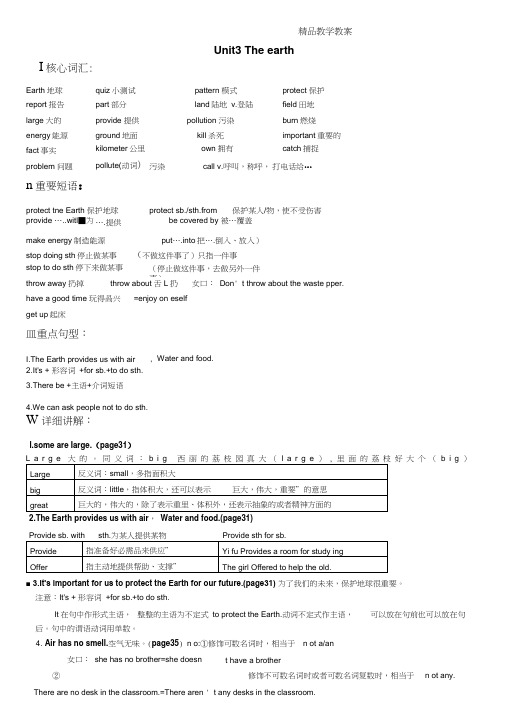
I 核心词汇:Earth 地球 quiz 小测试 pattern 模式 protect 保护 report 报告 part 部分 land 陆地 v.登陆 field 田地 large 大的 provide 提供 pollution 污染 burn 燃烧 energy 能源 ground 地面 kill 杀死 important 重要的 fact 事实 kilometer 公里 own 拥有catch 捕捉problem 问题pollute(动词) 污染call v.呼叫,称呼, 打电话给…n 重要短语:protect tne Earth 保护地球 protect sb./sth.from 保护某人/物,使不受伤害provide …..witl ■为 ….提供 be covered by 被…覆盖make energy 制造能源 put ….into把….倒入、放入)stop doing sth 停止做某事 (不做这件事了)只指一件事stop to do sth 停下来做某事 (停止做这件事,去做另外一件事)throw away 扔掉throw about 舌L 扔 女口: Don ' t throw about the waste pper.have a good time 玩得咼兴 =enjoy on eselfget up 起床皿重点句型:I.The Earth provides us with air , Water and food.2.It's + 形容词 +for sb.+to do sth.3.There be +主语+介词短语4.We can ask people not to do sth.W 详细讲解:l.some are Iarge.(page31)好大个(b i g ) 2.The Earth provides us with air , Water and food.(page31) ■ 3.It's important for us to protect the Earth for our future.(page31) 为了我们的未来,保护地球很重要。
2018-2019学年沪教牛津版初中英语初一7年级上英语单词(含音标)

2018-2019学年沪教牛津版初中英语初一7年级上英语单词(含音标)沪教牛津版初一(7上)英语语音过关Unit 1 Making Friends词汇学习四会要求:①○会认读:最初新词可通过音标或老师或设备领读模仿熟练直至一看词形便能立刻反射出声音②○懂意思:知道中文意思及词性③活运用:结合课本原句或文段去记它的中文意思和用法④○能拼写:注意单词中有哪些元音字母或元音字母组合,结合自然拼音法知道对应的字母或组合发什么音词形词性读音中文意思基本用法课本原句(组词造句)*** *(读准音) (句)(字母&组合)(文句)(巩固记忆)(巩固记忆)(巩固记忆)遮掩默写1次词形词性音标中文意思遮掩默写3次遮掩默写2次1German adj.['dm?德国的,德国人的,德语n]2blog n.[bl?ɡ]博客3grammar n.['gr?m?]语法4sound n.[sa?nd]听起来、声音5complete v.[k?m'pli?t]完成6hobby n.['h?b?]爱好7country n.['k?ntr?]国家、乡下8age n.[e?d?]年龄9dream v.[dri?m]梦想,做梦1everyone pron['evr?w?n]每个人2Germany n.['dm?n?]德国3mountain n.['ma?nt?n]山脉4elder adj. ['eld?]年龄较大的,年长的5friendly['fren(d)l?]友好的6engineer n.[end??'n??]工程师7world n.[w??ld]世界8Japan n.[d??'p?n]日本9flat adj. [fl?t]平房,平坦的0yourself pron[j??'self]你自己1US n.美国close to 靠近 go to school 去上学 be good at擅长make friends with 和。
深圳沪教版初中英语七年级上课文+知识点
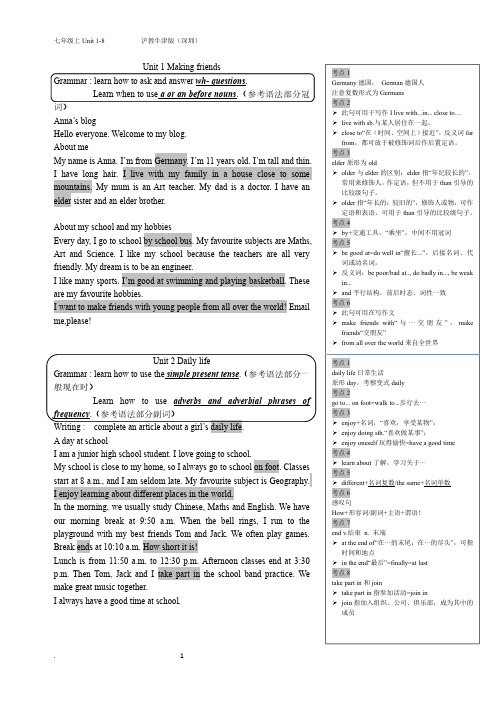
Anna’s blogHello everyone.Welcome to my blog.About meMy name is Anna.I’m from Germany.I’m 11years old.I’m tall and thin.I have long hair.I live with my family in a house close to some mountains.My mum is an Art teacher.My dad is a doctor.I have an elder sister and an elder brother.About my school and my hobbiesEvery day,I go to school by school bus.My favourite subjects are Maths,Art and Science.I like my school because the teachers are all very friendly.My dream is to be an engineer.I like many sports.I’m good at swimming and playing basketball.These are my favourite hobbies.I want to make friends with young people from all over the world!Email me,please!I am a junior high school student.I love going to school.My school is close to my home,so I always go to school on foot.Classes start at 8a.m.,and I am seldom late.My favourite subject is Geography.I enjoy learning about different places in the world.In the morning,we usually study Chinese,Maths and English.We have our morning break at 9:50a.m.When the bell rings,I run to the playground with my best friends Tom and Jack.We often play games.Break ends at 10:10a.m.How short it is!Lunch is from 11:50a.m.to 12:30p.m.Afternoon classes end at 3:30p.m.Then Tom,Jack and I take part in the school band practice.We make great music together.I always have a good time at school.and fields.Some places are very hot,and some are very cold.There are many different plants.Some are large.Some are small.All plants need light and water.There are different animals on Earth too.Some live on the land.Some fly in the sky.Some live under the water.There are also many people like you and me on Earth.The Earth provides us with air,water and food.It is our home.Today,there is a lot of pollution.We burn things to make energy.This pollutes the air.We put our rubbish into the sea and under the ground.This pollutes the Earth and kills animals and plants.We must stop doing these things.It is important for us to protect the Earth for our future.SpringIn spring,the weather starts to get warm.The wind blows gently.It often rains.Plants start to grow.Everything turns green.It is exciting to take a trip in spring.SummerThe weather is hot in summer.The sun shines brightly.Many people like to go to the beach and swim in the sea.It is nice to eat ice cream in the hot weather.AutumnIn autumn,everything changes.Leaves turn brown,red or yellow and start falling from the trees.It is nice to go on a picnic at this time of year because the weather is cool and dry.WinterWinter is often cold and snowy.Children love winter because they love to play in the snow.It is interesting to make snowmen.People usually spend time with their relatives during the Spring Festival.考点1The Earth 独一无二,要用冠词on earth 世界上on the earth 在地球上考点2此句可用于环境类写作provide sb.with sth.=provide sth.for sb.“为某人提供某物”The sun provides us with heat and light.=The sun provides heat and light for us.考点3pollution “污染”,不可数名词 pollute “污染”,动词 polluted “受污染的”,形容词/过去分词考点4put...into “把···倒入···;将···注入···”拓展:put up 提出、张贴;put off 推迟;put away 把···收起来;put down 放下,写下;put on 穿上,增加(体重);put out 扑灭,熄灭考点5stop doing sth.停止做某事stop to do sth.停下来去做另一件事考点6此句可用在写作文It is +adj.for sb.to do sth.“对于某人来说,做某事是...的”注:当形容词表示人物性格、特点时,for 要变为of 。
沪教牛津版七年级上册英语教材
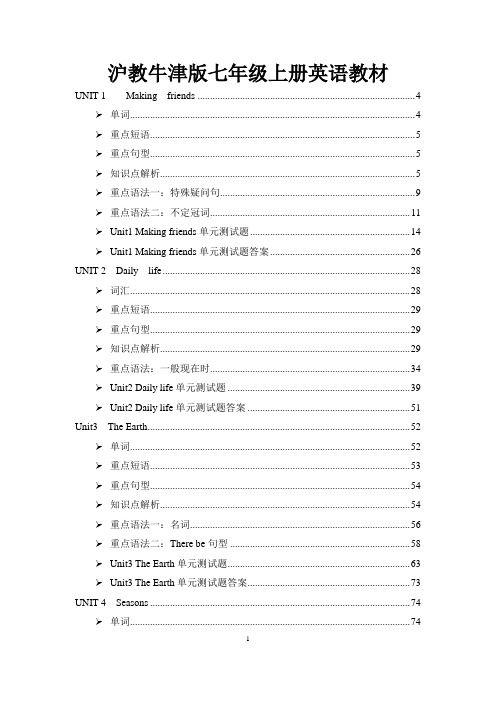
沪教牛津版七年级上册英语教材UNIT 1 Making friends (4)➢单词 (4)➢重点短语 (5)➢重点句型 (5)➢知识点解析 (5)➢重点语法一:特殊疑问句 (9)➢重点语法二:不定冠词 (11)➢Unit1 Making friends单元测试题 (14)➢Unit1 Making friends单元测试题答案 (26)UNIT 2 Daily life (28)➢词汇 (28)➢重点短语 (29)➢重点句型 (29)➢知识点解析 (29)➢重点语法:一般现在时 (34)➢Unit2 Daily life单元测试题 (39)➢Unit2 Daily life单元测试题答案 (51)Unit3 The Earth (52)➢单词 (52)➢重点短语 (53)➢重点句型 (54)➢知识点解析 (54)➢重点语法一:名词 (56)➢重点语法二:There be句型 (58)➢Unit3 The Earth单元测试题 (63)➢Unit3 The Earth单元测试题答案 (73)UNIT 4 Seasons (74)➢单词 (74)➢重点句型 (75)➢知识点解析 (75)➢重点语法:形容词 (79)➢Unit4 单元测试题 (83)➢Unit4 单元测试题答案 (92)UNIT 5 Visiting the Moon (93)➢单词 (93)➢重点短语 (94)➢重点句型 (94)➢知识点解析 (94)➢重点语法:一般将来时 (97)➢Unit5单元测试题 (102)➢Unit5单元测试题答案 (110)Unit 6 Travelling around Asia (111)➢单词 (111)➢重点短语 (112)➢重点句型 (112)➢知识点解析 (112)➢重点语法:条件状语从句 (120)➢Unit6单元测试题 (121)➢Unit6单元测试题答案 (130)Unit7 School clubs (132)➢单词 (132)➢重点短语 (133)➢重点句型 (133)➢知识点解析 (133)般过去时 (136)➢Unit7 School Clubs单元测试题 (142)➢重点短语 (153)➢重点句型 (153)➢知识点解析 (153)➢重点语法:代词 (154)➢Unit8单元测试题 (157)➢Unit8单元测试题答案 (167)UNIT 1 Making friends ➢单词➢重点短语1.colse to 接近 = near 反义词:far (away)from 远离2.go to school 去上学3.be good at 擅长 =do well in 反义词:be bad /poor at=do badly in不擅长4.make friends with 与……交朋友 make friends 交朋友5.all over 遍及6.’d like to=would like to 愿意➢重点句型1.what does···mean?2.welcome to3.I like···because···4.My dream is to be··?5.How old is/are ····?6.What does ····do?➢知识点解析【知识点一】Read a German girl’s blog。
牛津深圳初中英语七上Unit 3《The Earth Reading》课件
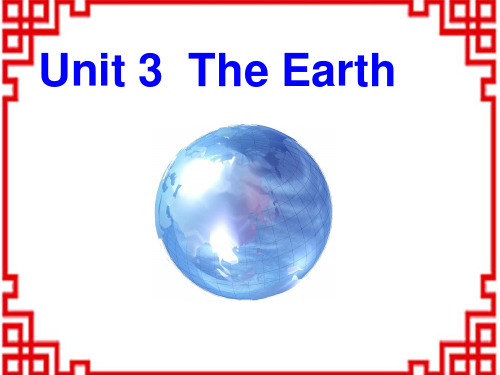
3
4
_T_h_e_re__a_r_e_m__a_n_y___ T_h_e_r_e__a_re__fo_r_e_s_t_s _d_if_fe_r_e_n_t_p_l_a_n_ts_.___ a_n_d__r_iv_e_r_s_, _____ _T_h_e_re__a_r_e_d_i_ff_e_r_e_n_t m__o_u_n_t_a_in_s__a_n_d__ _an__im__a_ls__o_n_E__a_rt_h__ f_ie_l_d_s_._________
1
2
stars
__th_e______ 3 _Sun
_th_e__M_o__o_n_ 4_
the Earth the Moon the Sun
_th_e_______ ___s_ta_r____
1. What are the blue parts?
2. What are the green and brown parts?
4. This pollutes the Earth and kills
animals
and plants.
a. cleans
b. makes …die
5. It is important for us to protect the
Earth for our future.
a. Keep… safe b. change
_ti_f_u_l _ live under the w__a__te__r.
_p_la_c_. •There are also _m__a_n__y__p_e__o_p_lelike you and
T 4. There is air pollution, water pollution and land pollution on Earth.
Unit3语法课件2024-2025学年沪教牛津版七年级英语上册

1. 找出这里含有形容词的句子
Recently Beijing Universal Studios theme park has opened. The park is the fifth universal cinema in the world and is so beautiful! Today, I got up early to rush to the park. The theme park looks fantastic! When I stepped into the Wizarding World of Harry Potter, I got crazy because Harry Potter is my idol! Then I spent a day in this park. I remained excited when I was leaving. How I wish I could stay here forever even if it seems impossible! But I think I will come back again!
Oct. 1st
1. 形容词副词概念 2. 形容词副词用法
1. The park is beautiful. 是漂亮的 2. The theme park looks fantastic!看起来超棒 3. I got crazy because Harry Potter is my idol! 变得疯狂 4. I remained excited when I was leaving. 保持兴奋 5. How I wish I could stay here forever even if it seems impossible!
2020年牛津译林版七年级英语上册unit3 Grammar课件
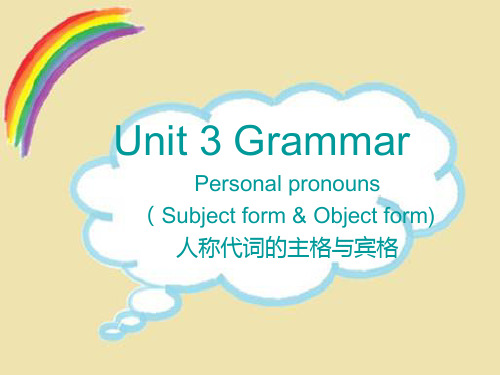
asks _u_s_ to read dialogues. ( 我们)
4. ---Do _th__ey_ often watch TV? ---No. Mum asks _th__em__ not to watch TV too much. (他们)
5. Jack likes reading books. _H_e_ is a member of the Reading Club. Do you know _h_im__? (他)
It is our school. Do you like it?
I am your English teacher. You can call me Miss Wu.
She is your Chinese teacher. You can call her Miss Chen.
He is your Maths teacher. You can call him Mr. Zhou.
词 我 你 他 她 它 我们 你们 他们 义
Examples
1. All my friends are really great! I love them
very much.
them作love这个动词的宾语,代替 all my friends这个名词短语
2. My school is very big. I like it very much.
广州牛津新版七年级上册Unit3 The Earth 复习资料

广州牛津新版七年级上册Unit3 The Earth 复习资料一、单词短语默写地球 知识竞赛;小测试模式;形式保护报告部分陆地田地大的提供污染燃烧能量;能源污染到....里面;进入地面杀死必须重要的事实公里;千米自己的捕捉不多;很少去别处;朝另一个方向 问题;难题短语为....提供. 把....倒入... 扔掉二、Reading1. There are forests and rivers, mountains and fields.有森林、河流、高山和田野。
field此处是可数名词,意为“田野;田地”work in the fields在田里干活a football field一个足球场the field of science科学领域2. Some places are very hot, and some are very cold.some…some一些……另一些……,some…others一些……另一些(不是全部)……some…the others 一些……其它的(剩下的全部)……区分:one…the other 一个……另一个……3. Some are large. Some are small. 一些很大。
一些很小。
large意为―大的,巨大的‖,常指面积,范围,可表示数和量(当它直接用于人时,可表示身体的大),其反义词为small。
如:They say China is a large and beautiful country.他们说中国是一个面积大而美丽的国家。
We have a large farm.我们有一个大农场。
I like the colour, but it's too large。
我喜欢这种颜色,但是它太大了.a large number of 大量的big―大的‖,常指容积,重量等(还可表示―伟大,重要‖之意)。
用于具体事物(其反义词多为little)。
Unit 3 The Earth Grammar 教学设计2024学年牛津深圳版英语七年级上册

能够正确区分可数名词与不可数名词;掌握句式there is/are…的用法。
内化和运用带有量词的数量表达法,准确描述所购买的商品; 通过句型操练归纳there is/are…句式的区别。
教学难点:
能归纳there be 句型的结构与用法以及理解单数名词与复数名词的变化规律。
能够正确运用所学的可数名词与不可数名词,there be…句型进行跨文化沟通。
教学方法
英语教学活动观,情境式教学
教学工具
PPT 课件,多功能白板,教案
教学流程图
教学过程
教学目标
教学活动及互动方式(时间)
设计意图
效果评价
第三部分
创新迁移
第二部分
应用实践
情境中呈现对话,归纳总结规律
呈现例句,归纳总结规律
第一部分
学习理解
小组活动:快问快答 小组活动:创编对话
翻译短语 单项选择
话题导入
讨论问题
What would you like for breakfast?
用There be…句型介绍你的房间并拍摄Vlog 进行分享
对话 造句 短文填空
语法课评价量表。
牛津译林版英语七上Unit 3《Welcome to our school》(Grammar)教学设
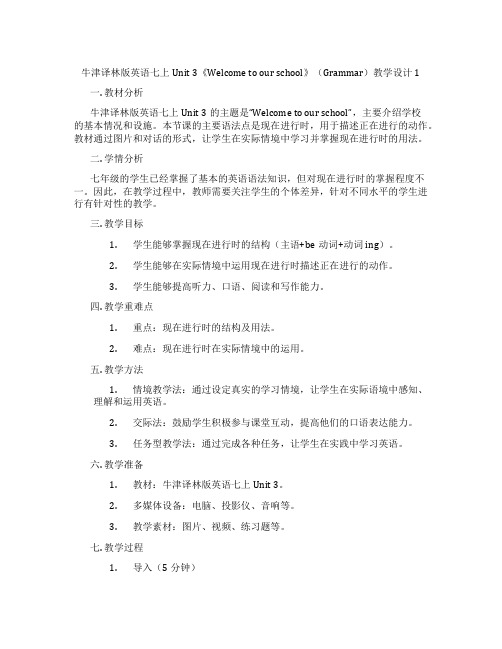
牛津译林版英语七上Unit 3《Welcome to our school》(Grammar)教学设计1一. 教材分析牛津译林版英语七上Unit 3的主题是“Welcome to our school”,主要介绍学校的基本情况和设施。
本节课的主要语法点是现在进行时,用于描述正在进行的动作。
教材通过图片和对话的形式,让学生在实际情境中学习并掌握现在进行时的用法。
二. 学情分析七年级的学生已经掌握了基本的英语语法知识,但对现在进行时的掌握程度不一。
因此,在教学过程中,教师需要关注学生的个体差异,针对不同水平的学生进行有针对性的教学。
三. 教学目标1.学生能够掌握现在进行时的结构(主语+be动词+动词ing)。
2.学生能够在实际情境中运用现在进行时描述正在进行的动作。
3.学生能够提高听力、口语、阅读和写作能力。
四. 教学重难点1.重点:现在进行时的结构及用法。
2.难点:现在进行时在实际情境中的运用。
五. 教学方法1.情境教学法:通过设定真实的学习情境,让学生在实际语境中感知、理解和运用英语。
2.交际法:鼓励学生积极参与课堂互动,提高他们的口语表达能力。
3.任务型教学法:通过完成各种任务,让学生在实践中学习英语。
六. 教学准备1.教材:牛津译林版英语七上Unit 3。
2.多媒体设备:电脑、投影仪、音响等。
3.教学素材:图片、视频、练习题等。
七. 教学过程1.导入(5分钟)利用图片和视频展示学校的基本设施和场景,引导学生谈论正在进行的活动,如“The students are studying in the classroom.”,从而引出本节课的主题和语法点。
2.呈现(10分钟)讲解现在进行时的结构(主语+be动词+动词ing),并通过例句展示现在进行时的用法。
如:“I am reading a book.”,让学生跟读并模仿。
3.操练(10分钟)设计不同场景的对话,让学生用现在进行时进行 role-play。
Unit3知识点梳理2023-2024学年牛津译林版英语七年级上册

第三讲 7A Unit3 Language Point 梳理1.让某人(不)做某事let/ make/ have sb. (not) _____ sth.get/ tell/ ask sb. (not) _____ sth.2. 九大建议句型两个祈使句:Let’s do….Shall we do…?两个Why:Why not sb. do…?Why don’t sb. do…?两个about:What about doing…?How about doing…?两个would:Would you like to do…?Would you please do…?⭐had better do….3.walk to spl. 步行去某地= go to spl. on foot类似用法:骑车去某地ride to spl.= go to spl. by bike ( on one’s bike)开车去某地drive to spl. =go to spl. by car (in one’s car)坐公交/地铁去某地take the bus/underground to spl.= go to spl. by bus/ underground (on the bus/underground)①和某人一起散步walk with sb.带某人去散步take sb. for a walk②遛狗walk one's dog = take the dog for a walk③去散步go for a walk= take a walk= go walking④five minutes’ walk(易错)=()How far is it from here to you school?It’s about twenty __________ (minute) walk.4.I walk to my bowl many times a day. (ic) 我一天走向我的碗好几次。
牛津译林版英语七上Unit 3《Welcome to our school》(Grammar)教学设
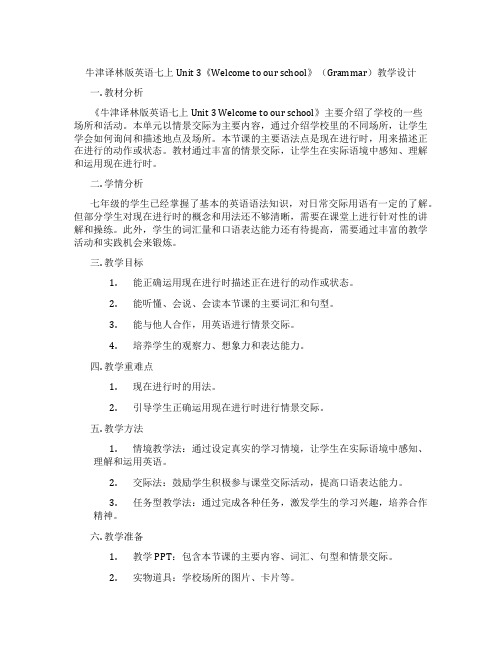
牛津译林版英语七上Unit 3《Welcome to our school》(Grammar)教学设计一. 教材分析《牛津译林版英语七上Unit 3 Welcome to our school》主要介绍了学校的一些场所和活动。
本单元以情景交际为主要内容,通过介绍学校里的不同场所,让学生学会如何询问和描述地点及场所。
本节课的主要语法点是现在进行时,用来描述正在进行的动作或状态。
教材通过丰富的情景交际,让学生在实际语境中感知、理解和运用现在进行时。
二. 学情分析七年级的学生已经掌握了基本的英语语法知识,对日常交际用语有一定的了解。
但部分学生对现在进行时的概念和用法还不够清晰,需要在课堂上进行针对性的讲解和操练。
此外,学生的词汇量和口语表达能力还有待提高,需要通过丰富的教学活动和实践机会来锻炼。
三. 教学目标1.能正确运用现在进行时描述正在进行的动作或状态。
2.能听懂、会说、会读本节课的主要词汇和句型。
3.能与他人合作,用英语进行情景交际。
4.培养学生的观察力、想象力和表达能力。
四. 教学重难点1.现在进行时的用法。
2.引导学生正确运用现在进行时进行情景交际。
五. 教学方法1.情境教学法:通过设定真实的学习情境,让学生在实际语境中感知、理解和运用英语。
2.交际法:鼓励学生积极参与课堂交际活动,提高口语表达能力。
3.任务型教学法:通过完成各种任务,激发学生的学习兴趣,培养合作精神。
六. 教学准备1.教学PPT:包含本节课的主要内容、词汇、句型和情景交际。
2.实物道具:学校场所的图片、卡片等。
3.教学录音机:用于播放听力材料。
4.黑板、粉笔:用于板书重点内容。
七. 教学过程1.导入(5分钟)利用校园场景的图片,引导学生谈论自己所在的学校,激发学生的学习兴趣。
2.呈现(10分钟)展示本节课的主要词汇和句型,如classroom, office, library等,以及现在进行时的结构:be doing。
通过图片和实物道具,让学生直观地理解现在进行时的用法。
七年级英语上册(沪教牛津版2024)-【新教材解读】义务教育教材内容解读课件

More practice: An email from Jason to Anna Study skills: reference books :
Alphabetical order Culture corner: Addresses in English
新பைடு நூலகம்教材体例结构对比
旧教材单元 旧教材
新教材单元 新教材
1.导读页:无
1.导读页:提出关键问题 单元学习目标 思考本单元要学习的问题
2.Reading: Visiting Shanghai
2.Reading: A guide to Shanghai
Listening: Three cities in Asia
Writing: Writing a post about your friend
Focusing on culture: A true friend
Cross-curricular connection: Learning in different ways
Project: Making a presentation on friends and friendship
/s/ /z/ /iz/ Writing: Fang Fang's daily life
Unit 2 School life
More practice: The daily life of Jason's mother Study skills: \
Culture corner: Dear Diary
Writing: My favourite season
牛津译林版七年级上册英语Unit 3 Grammar知识点总结讲解(无答案)

Unit 3 Welcome to our schoolGrammar知识点梳理:1.人称代词人称代词是用来代指人或事物的代词,有人称,数(单复数),格(主格,宾格)以及性别(男女)的变化。
人称代词分为主格和宾格两种形式。
其变化规律如下表所示:主格,在句中作主语I have many new friends. They are all very nice.Are you in class4,Grade7?宾格,在句中作动词或介词的宾语Thank you for helping me with my homework.My school is beautiful. I like it very much.人称代词的顺序单数的人称代词为第二人称,第三人称,第一人称(2,3,1)复数的人称代词为第一人称,第二人称,第三人称(1,2,3)【辨析】区别it / one:it代替上文提到的那样东西,同一物one 只能代替可数名词,同类不同物练习:1)Who is knocking at the door? ____ may be Jim.2)Kate buys a new computer. I also want to buy ____.3)Do you have a pen? Sorry, I don’t have ______.4)There’s a book on the ground. Is _____ yours?2.物主代词表示所有关系的代词叫做物主代词,也可叫做代词所有格。
物主代词分形容词性物主代词和名词性物主代词二种,其人称和数的变化见下形容词性物主代词+名词 =名词性物主代词名词性物主代词后不必加名词。
E.g. Is this your book? No,it isn’t,it’s hers(her book). This pen is mine.练习:用适当的人称代词填空。
1)Mr Li is a good teacher. works hard.2)-Who’s the woman?- is my aunt.3)We all likes sport. is a good for us..4)-Can sit here?-Yes, you can.5)The twins live in Beijing. are dancers.6)They are my new friends. Do you want to know ?7)Miss Li is our English teacher. all like very much.8)Nice to meet ,Tom.9)This is my dog. is two years old.10)Li Ming and Zhang Dong are in the same class. are classmates.11)I have many good friends and I often play with .12)I love my parents and they love .13)Lily is over there. Let go to the playground and play football with her.14)I have a cat. is very short and small.15)That isn’t______(I)kite. That kite is very small, but ______(I)is very big.16)The dress is _____(she).Give it to ______(she).17)Here are many dolls, which one is ______(she)?18)Look at the little baby. How happy ____ is!单选:()1.______ can play volleyball this afternoon.A.I and he B. She and me C. He and I D. I and her()2.---Is your name Bob? ---Yes,___________.A.I am B. it isn’t C. it is D. this is()3.---Who are they? ---We call _______ Mr Green and Mr Smith.A.they B. their C. them D. theirs()4.---How much are these shoes? ---______are eighty ________.A.They, dollarB. These, dollarC. They, dollarsD. These, dollars ()5. ---Is this your pencil sharpener? ---No, it isn’t. It’s _____pencil sharpener.A.myB. herC. heD. she()6.The English teacher asked ______ to go to his office.A. I, Jim and KateB. Jim, Kate and IC. Jim, Kate and meD. me, Jim and Kate()7.The girl is between _______.A.I and he B. I and him C. him and me D. me and he ()8. The man in a blue shirt is our teacher. He teaches______ English.A.we B. our C. us D. ours3.特殊疑问词询问日期:What’s the date today?=What date is it today?询问星期:What’s the day today?=What day is it today?询问几点:What’s the time?=What time is it?how/how long/how often/how far/how many/how much【辨析】what time&whenwhat time询问具体的时间,如某一天的几点几分;when询问的时间笼统,不一定是具体时间,如年、月、日、上午、下午、晚上等【拓展】out of date过时date[n.]约会I’m keeping a date.练习:1)The meeting begins at 2:30 p.m.______ _______ ________the meeting _______?2)It’s Monday today._______ ________ is it today?3)It’s was October 12th yesterday._________ ________ ______ ________ yesterday?4)The shop is open from 8:00 a.m. to 10:30 p.m._________ _______ the shop ________?5)It’s about 30 minutes’ walk from my home to the school.______ ________ ________ _______ from ______ home to school?6)Frank moved to Hong Kong in 2010._______ ________ Frank ________ to Hong Kong?7)--_______is that man over there? --He is Dick’s uncle.A.Where B. Whose C. Who D. Which8)--你怎么回家的?--我坐地铁回家。
沪教牛津版七上英语单词表

沪教牛津版七年级上册英语单词表Unit 1 Making friends1. German /ˈdʒɜːmən/ adj. 德国的;德国人;德语;n. 德国人;德语2. blog /blɒɡ/ n. 博客3. grammar /ˈɡræmə(r)/ n. 语法4. sound /saʊnd/ n. 声音;v. 听起来5. complete /kəmˈpliːt/ v. 完成;adj. 完全的,完整的6. hobby /ˈhɒbi/ n. 爱好7. country /ˈkʌntri/ n. 国家8. age /eɪdʒ/ n. 年龄9. dream /driːm/ n. 梦想;v. 做梦10. everyone /ˈevriwʌn/ pron. 每个人11. Germany /ˈdʒɜːməni/ n. 德国12. mountain /ˈmaʊntən/ n. 山,山脉13. elder /ˈeldə(r)/ adj. 年长的14. friendly /ˈfrendli/ adj. 友好的15. engineer /ˌendʒɪˈnɪə(r)/ n. 工程师16. world /wɜːld/ n. 世界17. Japan /dʒəˈpæn/ n. 日本18. flat /flæt/ n. 公寓19. yourself /jɔːˈself/ pron. 你自己20. US /ˌjuːˈes/ n. 美国;美利坚合众国Unit 2 Daily life1. daily /ˈdeɪli/ adj. 每日的,日常的;n. 日报2. article /ˈɑːtɪkl/ n. 文章3. never /ˈnevə(r)/ adv. 从不4. table tennis /ˈteɪbl ˈtenɪs/ n. 乒乓球5. ride /raɪd/ v. 骑;乘6. usually /ˈjuːʒuəli/ adv. 通常地7. so /səʊ/ conj. 因此,所以;adv. 如此,这么8. seldom /ˈseldəm/ adv. 很少,不常9. geography /dʒiˈɒɡrəfi/ n. 地理10. break /breɪk/ n. 休息;v. 打破11. bell /bel/ n. 铃,钟12. ring /rɪŋ/ v. (使)发出钟声或铃声;n. 戒指13. end /end/ n. 结尾,末端;v. 结束14. band /bænd/ n. 乐队15. practice /ˈpræktɪs/ n. 练习;v. 练习16. together /təˈɡeðə(r)/ adv. 一起17. market /ˈmɑːkɪt/ n. 市场,集市18. guitar /ɡɪˈtɑː(r)/ n. 吉他19. grade /ɡreɪd/ n. 年级Unit 3 The Earth1. Earth /ɜːθ/ n. 地球2. quiz /kwɪz/ n. 知识竞赛;小测试3. pattern /ˈpætn/ n. 模式;图案4. protect /prəˈtekt/ v. 保护5. report /rɪˈpɔːt/ n. 报告;v. 报道6. part /pɑːt/ n. 部分7. land /lænd/ n. 陆地;v. 登陆8. field /fiːld/ n. 田野;场地9. large /lɑːdʒ/ adj. 大的10. provide /prəˈvaɪd/ v. 提供11. pollution /pəˈluːʃn/ n. 污染12. burn /bɜːn/ v. 燃烧13. energy /ˈenədʒi/ n. 能量;精力14. pollute /pəˈluːt/ v. 污染15. important /ɪmˈpɔːtnt/ adj. 重要的16. fact /fækt/ n. 事实17. kilometre /ˈkɪləmiːtə(r)/ n. 千米,公里Unit 4 Seasons1. season /ˈsiːzn/ n. 季节2. spring /sprɪŋ/ n. 春天3. warm /wɔːm/ adj. 温暖的4. summer /ˈsʌmə(r)/ n. 夏天5. hot /hɒt/ adj. 热的6. autumn /ˈɔːtəm/ n. 秋天7. cool /kuːl/ adj. 凉爽的8. winter /ˈwɪntə(r)/ n. 冬天9. cold /kəʊld/ adj. 冷的10. sunshine /ˈsʌnʃaɪn/ n. 阳光11. short /ʃɔːt/ adj. 短的;矮的12. holiday /ˈhɒlədeɪ/ n. 假期13. travel /ˈtrævl/ v. 旅行14. rise /raɪz/ v. 升起;上升15. set /set/ v. 落下;(日、月等)西沉16. late /leɪt/ adj. 晚的;迟的17. early /ˈɜːli/ adj. 早的Unit 5 Visiting the Moon1. visit /ˈvɪzɪt/ v. 参观;拜访2. moon /muːn/ n. 月亮;月球3. astronaut /ˈæstrənɔːt/ n. 宇航员4. space /speɪs/ n. 太空;空间5. leave /liːv/ v. 离开;出发6. breathe /briːð/ v. 呼吸7. if /ɪf/ conj. 如果8. return /rɪˈtɜːn/ v. 返回;归还9. more /mɔː(r)/ adj. 更多的;adv. 更,更多10. able /ˈeɪbl/ adj. 能够11. float /fləʊt/ v. 漂浮;浮动12. tie /taɪ/ v. 系;捆;n. 领带13. ourselves /ˌaʊəˈselvz/ pron. 我们自己14. without /wɪˈðaʊt/ prep. 没有15. weak /wiːk/ adj. 虚弱的;无力的Unit 6 Travelling around Asia1. Asia /ˈeɪʒə/ n. 亚洲2. guide /ɡaɪd/ n. 指南;导游;v. 引导3. area /ˈeəriə/ n. 地区;区域4. traditional /trəˈdɪʃənl/ adj. 传统的5. modern /ˈmɒdn/ adj. 现代的;时髦的6. sightseeing /ˈsaɪtsiːɪŋ/ n. 观光,游览7. centre /ˈsentə(r)/ n. 中心8. fountain /ˈfaʊntən/ n. 喷泉9. building /ˈbɪldɪŋ/ n. 建筑物10. just /dʒʌst/ adv. 正好,恰好11. across /əˈkrɒs/ prep. 穿过;横过12. light /laɪt/ n. 灯;光;v. 点燃;照亮13. direction /dəˈrekʃn/ n. 方向14. natural /ˈnætʃrəl/ adj. 自然的15. beauty /ˈbjuːti/ n. 美;美丽Unit 7 School clubs1. club /klʌb/ n. 俱乐部2. join /dʒɔɪn/ v. 加入;参加3. tell /tel/ v. 告诉;讲述4. first /fɜːst/ num. 第一;adv. 首先5. last /lɑːst/ adj. 最后的;v. 持续6. next /nekst/ adj. 下一个的;adv. 然后;接着7. term /tɜːm/ n. 学期8. start /stɑːt/ v. 开始;出发9. activity /ækˈtɪvəti/ n. 活动10. notice /ˈnəʊtɪs/ n. 布告,通告11. physics /ˈfɪzɪks/ n. 物理12. bored /bɔːd/ adj. 无聊的;厌烦的13. amazing /əˈmeɪzɪŋ/ adj. 令人惊异的14. useful /ˈjuːsfl/ adj. 有用的15. meeting /ˈmiːtɪŋ/ n. 会议Unit 8 Collecting things1. collect /kəˈlekt/ v. 收集;采集2. notebook /ˈnəʊtbʊk/ n. 笔记本3. postcard /ˈpəʊstkɑːd/ n. 明信片4. stamp /stæmp/ n. 邮票5. doorbell /ˈdɔːbel/ n. 门铃6. inside /ˌɪnˈsaɪd/ prep. 在……里面;adv. 在里面7. everywhere /ˈevriweə(r)/ adv. 到处,处处8. hardly /ˈhɑːdli/ adv. 几乎不9. space /speɪs/ n. 空间10. free /friː/ adj. 空闲的;免费的11. should /ʃʊd/ modal v. 应该12. hobby /ˈhɒbi/ n. 爱好13. fun /fʌn/ n. 乐趣;娱乐14. more than /mɔː(r) ðæn/ 多于,超过15. magazine /ˌmæɡəˈziːn/ n. 杂志。
七上牛津版英语Unit 3 The Earth-writing

Translate the following sentences into English.(根据范文,把以下句子翻译成英文)
1. 众所周知,改善环境意味着改善我们的生活。 _________________________________________ As we all know, to improve the _________________________________________ environment means to improve our life. 2. 保护好我们的地球母亲是非常重要的。 It is very important to protect our mother earth. _________________________________________ 3. 这导致了一些严重的问题,例如土地沙化,河 水变脏,空气也不如往日干净。 _________________________________________ This has caused some serious problems, _________________________________________ such as the land is sandy, the river is dirty, _____________________________ and the air is less clean. 3. 总而言之,我们只有一个地球,我们应尽全力 去保护她,不然我们会后悔的。 In all, we have only one earth, we should do _________________________________________ our best to protect it, or we will regret. 4. _________________________________________
沪教牛津版初中英语七年级上册Unit 3 The Earth
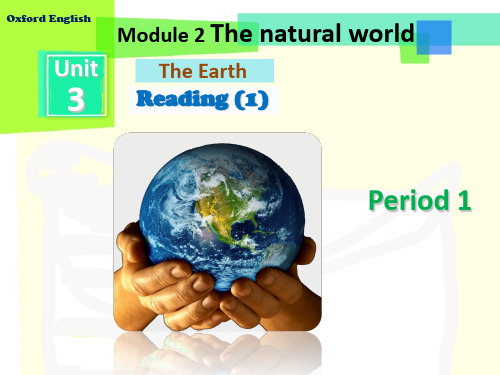
_t_h__e__S_u_n____
_t_h_e__M__o__o_n__
__t_h_e__E_a__r_t_h_
____s_t_a_r_s____
A2 In pairs, discuss the questions below.
clouds land
sea
1 What are the blue parts?
About the poster
Protect the Earth
A good poster has:
The Earth is a beautiful place.
There are forests and rivers, mountains and hot, and some are very cold.
each paragraph with the correct picture.
Paragraph 1
forests
rivers
mountains field
very hot
very cold
Paragraph 3 many people air, water and food
our home
Paragraph 2 different plants large small different animals on the land in the sky under the water
Places on Earth
There are many different plants. Some are large. Some are small. All plants need light and water. There are different animals on Earth too. Some live on the land. Some fly in the sky. Some live under the water.
- 1、下载文档前请自行甄别文档内容的完整性,平台不提供额外的编辑、内容补充、找答案等附加服务。
- 2、"仅部分预览"的文档,不可在线预览部分如存在完整性等问题,可反馈申请退款(可完整预览的文档不适用该条件!)。
- 3、如文档侵犯您的权益,请联系客服反馈,我们会尽快为您处理(人工客服工作时间:9:00-18:30)。
Countable nouns and uncountable nouns
名词分类 Countable nouns (可 数名词) animal, apple, map, 例子 article…… Uncountable nouns (不 可数名词) water, air, money, light, bread, paper, news, meat, practice, etc. A lot of = lots 许多的 an of animal much money 修饰词 既可修饰可数名词,也可 a map a lot of water 修饰不可数名词。多用于 some/many apples a piece of paper/news 肯定句。 This plant is beautiful. Air has no smell 例句 These cats are lovely.
肯定和否定 Yes, there is. 回答 No, there isn't.
Yes, there are. No, there aren't.
学以致用
• • • • • • 用be的正确形式填空。 are There _______ many monkeys in the mountain. is There _______ a beautiful garden in our school. is There _______ some water in the glass. There _______a bed and two chairs in is Betty’s room. are There _______thirty boys in the class.
可数名词变复数
可数名词的单数 形式 复数形式的变化 例子
一般形式
以x,s,sh,ch结尾的 词 以辅音字母y结尾 的词 以f/fe结尾的词 特殊词
直接加“s”
直接加“es” 变“y”为“i”再加 “es” 变“f”或“fe”为 “v”再加“es” 特殊变化
pen→pens;car→______ cars
There be 的否定形式及疑问形式
肯定形式
否定形式
there is
there isn't
There are
there aren't
例句
There is some water in the glass.
There are different animals on Earth.
疑问形式
Is there any water in the Are there different glass? animals on Earth?
•
• • •
Answers: DCABD
不可数名词和可数名词的定义
• 不可数名词是不可加不定冠词或具体数词 计算的名词 e.g. water, air, paper, meat • 可数名词是可加不定冠词或具体数词计算 的名词 e.g. a pen, two books,three chairs
Unit 3 The Earth
Period 5 Grammar
Content
speaking
reading
grammar
self-test
Daily speaking 1. Do you like making friends? Why? 2. What do you usually do with your friends?
2. 可数名词复数前可加few, a few, some, many, a number of, lots of 等修饰 • How many students are there in your class?
3. 既可加可数名词又可加不可数名词的修饰词有: • a lot of, lots of, some.
Thank You !
注: 以“O”结尾的可数名词,一般情况下变复 数都是直接加“s”,但是在 英雄hero, 黑人 negro,土豆potato,西红柿tomato这些单词 变复数时要加“es”。 (黑人英雄爱吃西红柿和土豆)
Have a try
Complete the sentences with a , an or some.(用a,an 或some 完成句子。) a 1. I can't use the blackboard. Please bring me ___ chalk. 2. I'd like ______ _____ some drink. Please give me some orange juice. a 3. My shoes are very old. I need ______ new pair. 4. We need some __ flowers for the party. 5. You have ____ terrible cold. You need some _____ a medicine.
Reading
•
In England, people don’t usually talk much. You can go on a bus, or in a train, and every one sits looking out of the window. Often they read. They read books and newspapers. But they don't talk much. When you meet English people, they often talk about one thing, the weather. So when you meet somebody in England, you can say, “Nice weather for the time of year!” “But it was a little cold yesterday,” somebody may answer. “But it got a bit warmer later,” you can say. Talk like this, and the English will think “How friendly you are!”
boxes buses box→_______ bus→______; families family→________ comedies comedy→_______
knife → knives; leaf → leaves _______
children child→____________ men man→______; feet teeth foot→_____tooth→____ ; sheep sheep→______
练习
C there in our class? 1.How many boys ____ A. be B. is C. are D. am 2. There ______ pencil-box and some flowers A on the desk. A. is a B. are some C. has a D. have some 3. There _____ A ten bananas and an apple in the basket. A. are B. is C. has D. have 4. There are so many green trees on ____ C sides of the street. A. either B. each C. both D. neither 5. There______ C anything new in today’s newspaper. A. is B. are C. isn’t D. are
• 如果"be"后的主语,是由and连接的两个 或两个以上的名词,那么be的形式要遵 循“就近原则”,即"be"的形式是由与 它最近的那个名词的形式来决定。例如: • 1.There is a book and some pens on the desk. • 2.Therearesome pens and a book on the desk.
练习
B on the wall. They are very beautiful. 1.There ______ A. are photoes B. are photos C. is a photo D. is photos 2. This kind of car _______ A made in Shanghai. A. is B. are C. were D. has 3. There are four _____ D and two ________ in the group. A. Japanese, Germen B. Japaneses, Germen C. Japanese, German D. Japanese, Germans C already. 4.The boys have got _______ A. two bread B. two breads
C. two pieces of bread D. two piece of bread
There be 句型
There be 句型主要是用来表达“某处(某时)有某 物(某人)” 其基本结构为 “There be +某物(某人)+某地 (某时)” • 对于be动词的确定 • 如果be动词后的名词是单数或不可数名词就 用is,否则就用are. 例如: is • 1.There ________a tree behind the house. • 2.There __________ some water in the bottle. is • 3.There__________ are some pears in the box.
